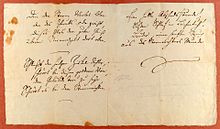- Ode to Joy
-
This article is about Schiller's poem. For other uses, see Ode to Joy (disambiguation).
"Ode to Joy" (German: "Ode an die Freude", first line: "Freude, schöner Götterfunken") is an ode written in 1785 by the German poet, playwright and historian Friedrich Schiller, enthusiastically celebrating the brotherhood and unity of all mankind. Despite the lasting popularity of the ode, Schiller himself regarded it as a failure later in his life, going so far as calling it "detached from reality" and "of value maybe for us two, but not for the world, nor for the art of poetry" in a letter to his long-time friend and patron Körner (whose friendship had originally inspired him to write the ode) that he wrote in the year 1800.
The ode is best known for its musical setting in D major by Ludwig van Beethoven in the final movement of his Ninth Symphony (completed in 1824), a choral symphony for orchestra, four solo voices and choir.
The Beethoven setting was adopted as the Anthem of Europe by the Council of Europe in 1972 and the then European Community—since 1993 the European Union—in 1985; the tune was also used in the anthem of Rhodesia. It has been used in a number of other contexts: notably in Stanley Kubrick's 1971 film A Clockwork Orange, a popular Muppet viral video starring Beaker, and in the Die Hard film franchise, In 1996, It became the theme song for Triple H in the World Wrestling Federation until early 1998. It is also the basic melody for the song "A Song of Joy" by Miguel Ríos, and "Road To Joy" by Bright Eyes.
Other musical settings of the poem include:
- Christian Gottfried Körner (1786)
- Carl Friedrich Zelter (1792), for choir and accompaniment, later on rewritten for different instrumentations.
- Johann Friedrich Reichardt (1796)
- Ludwig-Wilhelm Tepper de Ferguson (1796)
- Johann Friedrich Hugo von Dalberg (1799)
- Johann Rudolf Zumsteeg (1803)
- Franz Schubert's song "An die Freude" D 189 (1815), for voice and piano
- Pyotr Ilyich Tchaikovsky (1865), for solo singers, choir and orchestra in a Russian translation
- "Seid umschlungen, Millionen!" (1892), waltz by Johann Strauss II
- Z. Randall Stroope (2002), for choir and four-hand piano
External links
Categories:- Poetry by Friedrich Schiller
- 1785 poems
Wikimedia Foundation. 2010.

